MMM111 Intrapersonal Skills: Self-Reflection, SWOT, and Strategy
VerifiedAdded on 2023/06/11
|6
|1460
|89
Essay
AI Summary
This essay presents a self-reflection on the development of intrapersonal skills, incorporating a SWOT analysis to identify strengths, weaknesses, opportunities, and threats. The student aims to leverage strengths like analytical and collaborative skills while addressing weaknesses such as stubbornness and intolerance. Opportunities include utilizing leadership skills and embracing workplace diversity, while threats involve competitors with more practical experience. The personal strategy focuses on gaining practical knowledge, enhancing communication skills, and transforming weaknesses into strengths through courses, mentorship, and continuous self-assessment. The action plan outlines specific goals, strategies for change, resources, and new skills needed to improve communication, leadership, and networking abilities, ultimately aiming for personal and professional growth.
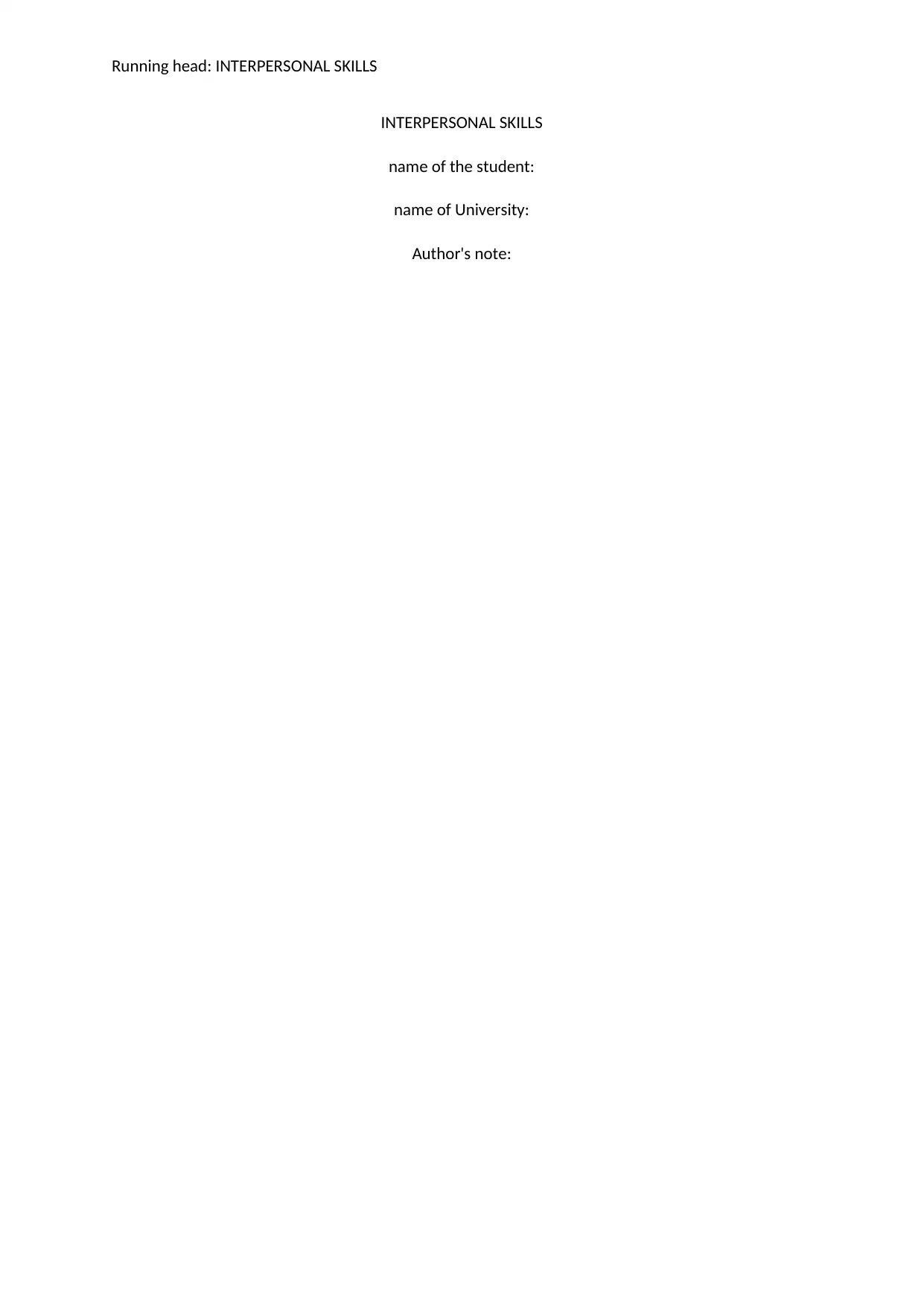
Running head: INTERPERSONAL SKILLS
INTERPERSONAL SKILLS
name of the student:
name of University:
Author's note:
INTERPERSONAL SKILLS
name of the student:
name of University:
Author's note:
Paraphrase This Document
Need a fresh take? Get an instant paraphrase of this document with our AI Paraphraser
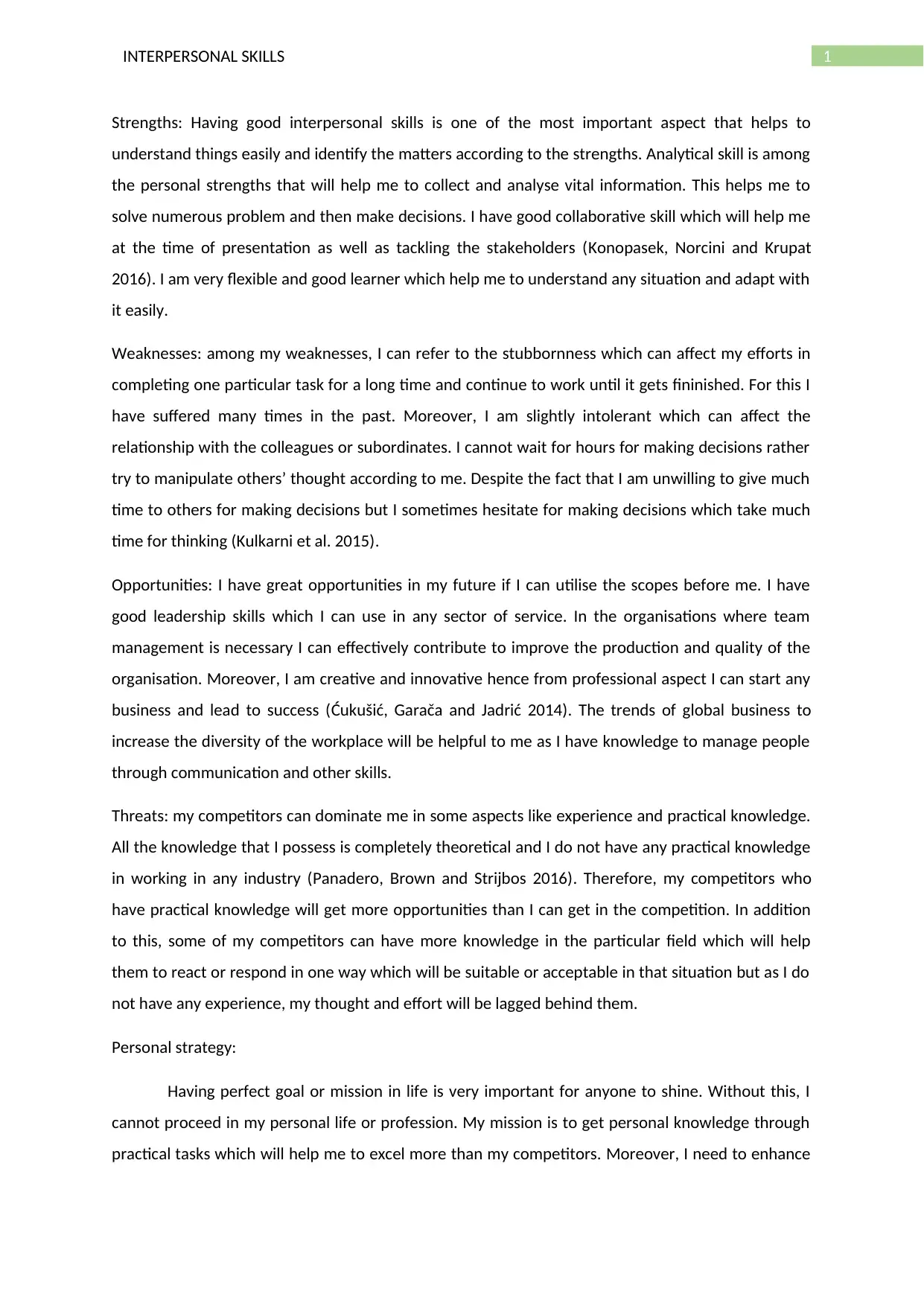
1INTERPERSONAL SKILLS
Strengths: Having good interpersonal skills is one of the most important aspect that helps to
understand things easily and identify the matters according to the strengths. Analytical skill is among
the personal strengths that will help me to collect and analyse vital information. This helps me to
solve numerous problem and then make decisions. I have good collaborative skill which will help me
at the time of presentation as well as tackling the stakeholders (Konopasek, Norcini and Krupat
2016). I am very flexible and good learner which help me to understand any situation and adapt with
it easily.
Weaknesses: among my weaknesses, I can refer to the stubbornness which can affect my efforts in
completing one particular task for a long time and continue to work until it gets fininished. For this I
have suffered many times in the past. Moreover, I am slightly intolerant which can affect the
relationship with the colleagues or subordinates. I cannot wait for hours for making decisions rather
try to manipulate others’ thought according to me. Despite the fact that I am unwilling to give much
time to others for making decisions but I sometimes hesitate for making decisions which take much
time for thinking (Kulkarni et al. 2015).
Opportunities: I have great opportunities in my future if I can utilise the scopes before me. I have
good leadership skills which I can use in any sector of service. In the organisations where team
management is necessary I can effectively contribute to improve the production and quality of the
organisation. Moreover, I am creative and innovative hence from professional aspect I can start any
business and lead to success (Ćukušić, Garača and Jadrić 2014). The trends of global business to
increase the diversity of the workplace will be helpful to me as I have knowledge to manage people
through communication and other skills.
Threats: my competitors can dominate me in some aspects like experience and practical knowledge.
All the knowledge that I possess is completely theoretical and I do not have any practical knowledge
in working in any industry (Panadero, Brown and Strijbos 2016). Therefore, my competitors who
have practical knowledge will get more opportunities than I can get in the competition. In addition
to this, some of my competitors can have more knowledge in the particular field which will help
them to react or respond in one way which will be suitable or acceptable in that situation but as I do
not have any experience, my thought and effort will be lagged behind them.
Personal strategy:
Having perfect goal or mission in life is very important for anyone to shine. Without this, I
cannot proceed in my personal life or profession. My mission is to get personal knowledge through
practical tasks which will help me to excel more than my competitors. Moreover, I need to enhance
Strengths: Having good interpersonal skills is one of the most important aspect that helps to
understand things easily and identify the matters according to the strengths. Analytical skill is among
the personal strengths that will help me to collect and analyse vital information. This helps me to
solve numerous problem and then make decisions. I have good collaborative skill which will help me
at the time of presentation as well as tackling the stakeholders (Konopasek, Norcini and Krupat
2016). I am very flexible and good learner which help me to understand any situation and adapt with
it easily.
Weaknesses: among my weaknesses, I can refer to the stubbornness which can affect my efforts in
completing one particular task for a long time and continue to work until it gets fininished. For this I
have suffered many times in the past. Moreover, I am slightly intolerant which can affect the
relationship with the colleagues or subordinates. I cannot wait for hours for making decisions rather
try to manipulate others’ thought according to me. Despite the fact that I am unwilling to give much
time to others for making decisions but I sometimes hesitate for making decisions which take much
time for thinking (Kulkarni et al. 2015).
Opportunities: I have great opportunities in my future if I can utilise the scopes before me. I have
good leadership skills which I can use in any sector of service. In the organisations where team
management is necessary I can effectively contribute to improve the production and quality of the
organisation. Moreover, I am creative and innovative hence from professional aspect I can start any
business and lead to success (Ćukušić, Garača and Jadrić 2014). The trends of global business to
increase the diversity of the workplace will be helpful to me as I have knowledge to manage people
through communication and other skills.
Threats: my competitors can dominate me in some aspects like experience and practical knowledge.
All the knowledge that I possess is completely theoretical and I do not have any practical knowledge
in working in any industry (Panadero, Brown and Strijbos 2016). Therefore, my competitors who
have practical knowledge will get more opportunities than I can get in the competition. In addition
to this, some of my competitors can have more knowledge in the particular field which will help
them to react or respond in one way which will be suitable or acceptable in that situation but as I do
not have any experience, my thought and effort will be lagged behind them.
Personal strategy:
Having perfect goal or mission in life is very important for anyone to shine. Without this, I
cannot proceed in my personal life or profession. My mission is to get personal knowledge through
practical tasks which will help me to excel more than my competitors. Moreover, I need to enhance
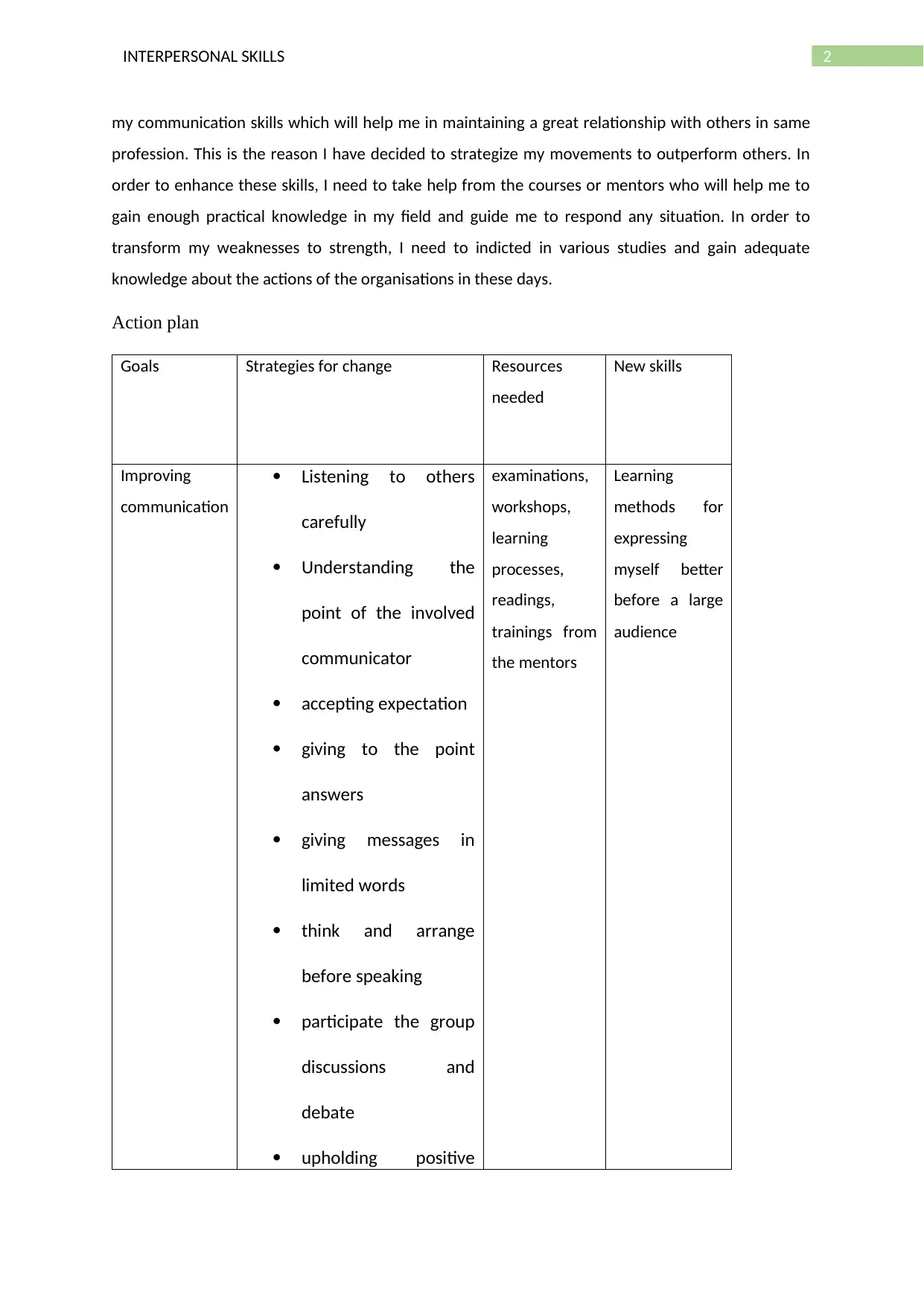
2INTERPERSONAL SKILLS
my communication skills which will help me in maintaining a great relationship with others in same
profession. This is the reason I have decided to strategize my movements to outperform others. In
order to enhance these skills, I need to take help from the courses or mentors who will help me to
gain enough practical knowledge in my field and guide me to respond any situation. In order to
transform my weaknesses to strength, I need to indicted in various studies and gain adequate
knowledge about the actions of the organisations in these days.
Action plan
Goals Strategies for change Resources
needed
New skills
Improving
communication
Listening to others
carefully
Understanding the
point of the involved
communicator
accepting expectation
giving to the point
answers
giving messages in
limited words
think and arrange
before speaking
participate the group
discussions and
debate
upholding positive
examinations,
workshops,
learning
processes,
readings,
trainings from
the mentors
Learning
methods for
expressing
myself better
before a large
audience
my communication skills which will help me in maintaining a great relationship with others in same
profession. This is the reason I have decided to strategize my movements to outperform others. In
order to enhance these skills, I need to take help from the courses or mentors who will help me to
gain enough practical knowledge in my field and guide me to respond any situation. In order to
transform my weaknesses to strength, I need to indicted in various studies and gain adequate
knowledge about the actions of the organisations in these days.
Action plan
Goals Strategies for change Resources
needed
New skills
Improving
communication
Listening to others
carefully
Understanding the
point of the involved
communicator
accepting expectation
giving to the point
answers
giving messages in
limited words
think and arrange
before speaking
participate the group
discussions and
debate
upholding positive
examinations,
workshops,
learning
processes,
readings,
trainings from
the mentors
Learning
methods for
expressing
myself better
before a large
audience
⊘ This is a preview!⊘
Do you want full access?
Subscribe today to unlock all pages.

Trusted by 1+ million students worldwide
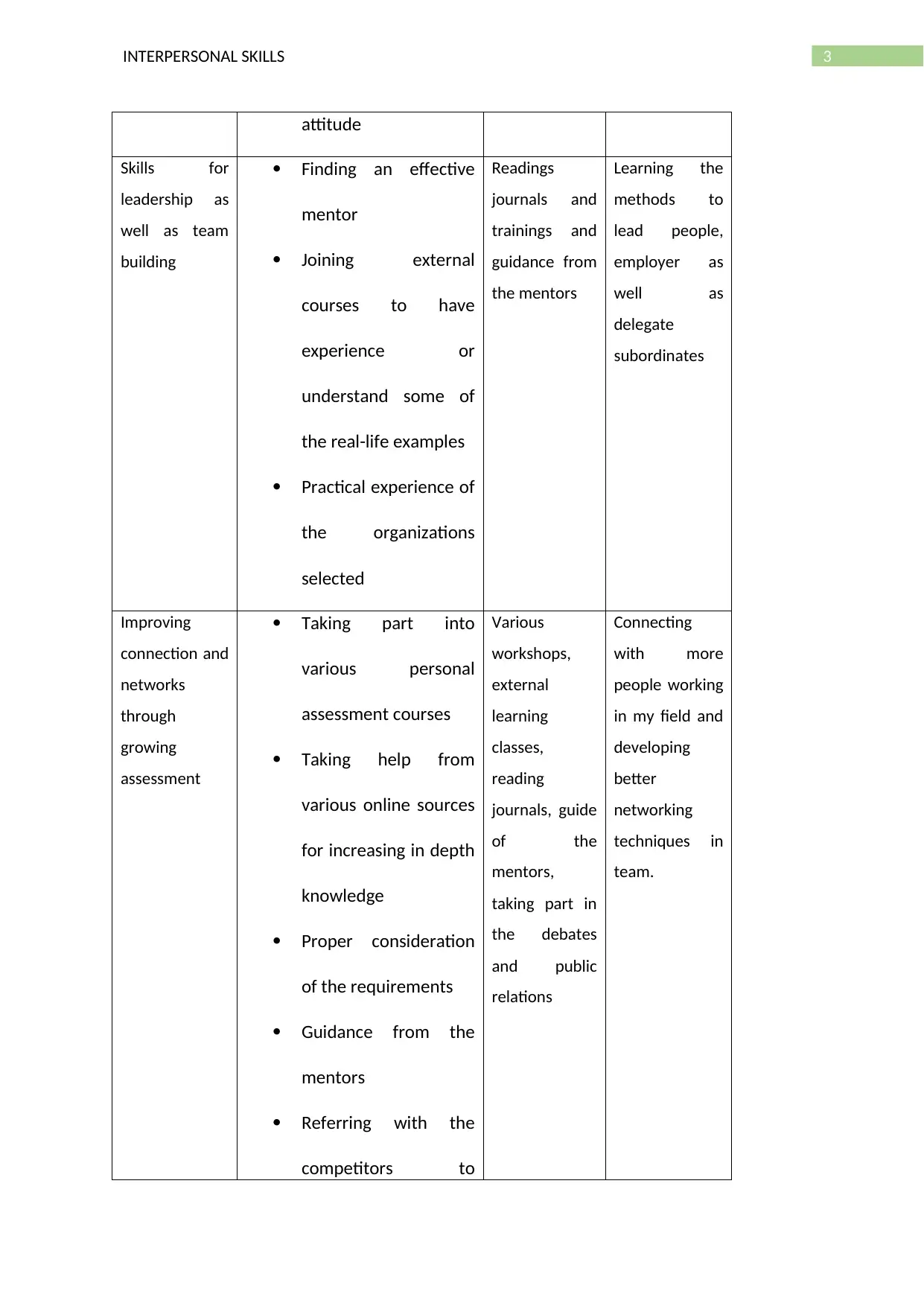
3INTERPERSONAL SKILLS
attitude
Skills for
leadership as
well as team
building
Finding an effective
mentor
Joining external
courses to have
experience or
understand some of
the real-life examples
Practical experience of
the organizations
selected
Readings
journals and
trainings and
guidance from
the mentors
Learning the
methods to
lead people,
employer as
well as
delegate
subordinates
Improving
connection and
networks
through
growing
assessment
Taking part into
various personal
assessment courses
Taking help from
various online sources
for increasing in depth
knowledge
Proper consideration
of the requirements
Guidance from the
mentors
Referring with the
competitors to
Various
workshops,
external
learning
classes,
reading
journals, guide
of the
mentors,
taking part in
the debates
and public
relations
Connecting
with more
people working
in my field and
developing
better
networking
techniques in
team.
attitude
Skills for
leadership as
well as team
building
Finding an effective
mentor
Joining external
courses to have
experience or
understand some of
the real-life examples
Practical experience of
the organizations
selected
Readings
journals and
trainings and
guidance from
the mentors
Learning the
methods to
lead people,
employer as
well as
delegate
subordinates
Improving
connection and
networks
through
growing
assessment
Taking part into
various personal
assessment courses
Taking help from
various online sources
for increasing in depth
knowledge
Proper consideration
of the requirements
Guidance from the
mentors
Referring with the
competitors to
Various
workshops,
external
learning
classes,
reading
journals, guide
of the
mentors,
taking part in
the debates
and public
relations
Connecting
with more
people working
in my field and
developing
better
networking
techniques in
team.
Paraphrase This Document
Need a fresh take? Get an instant paraphrase of this document with our AI Paraphraser
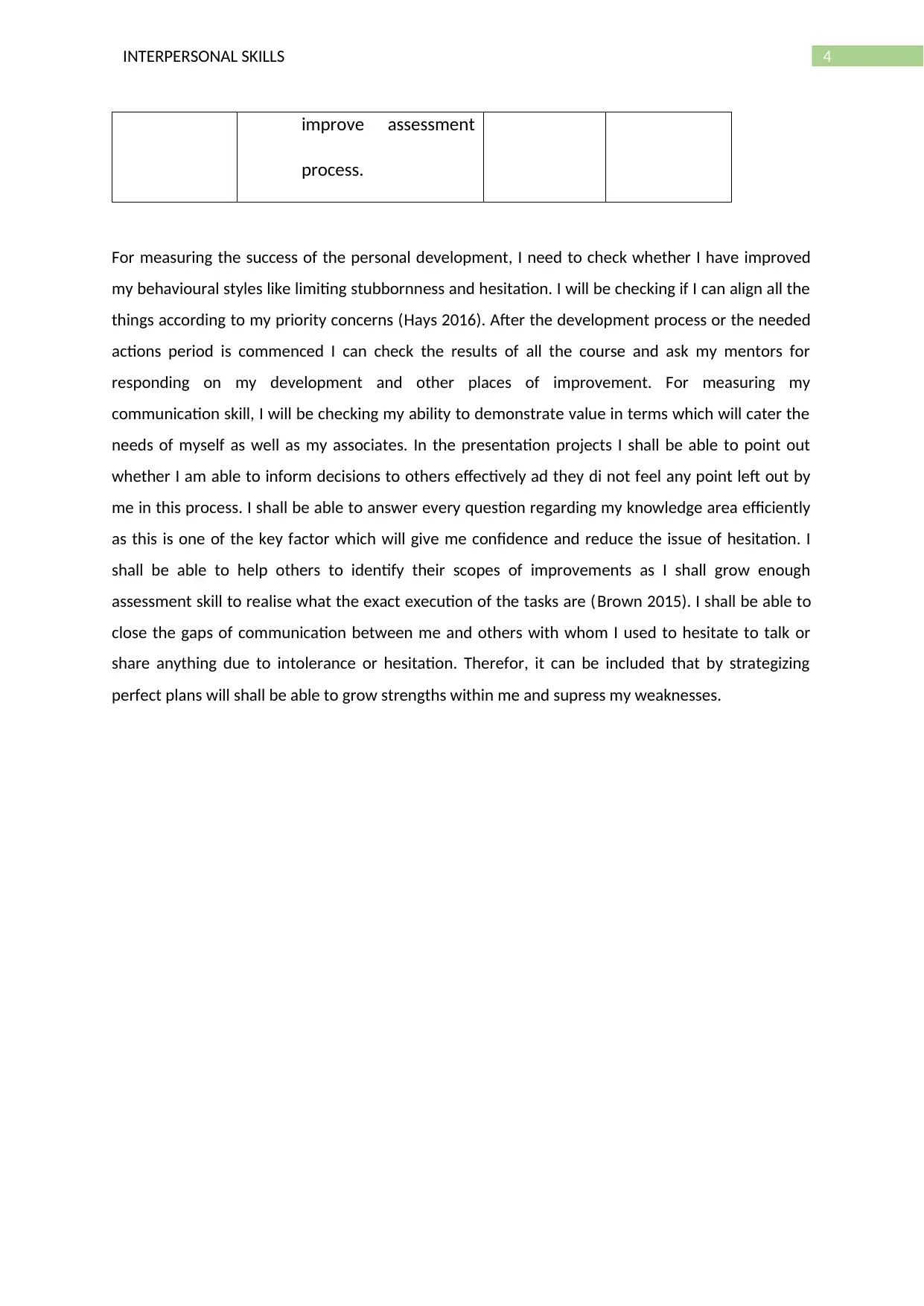
4INTERPERSONAL SKILLS
improve assessment
process.
For measuring the success of the personal development, I need to check whether I have improved
my behavioural styles like limiting stubbornness and hesitation. I will be checking if I can align all the
things according to my priority concerns (Hays 2016). After the development process or the needed
actions period is commenced I can check the results of all the course and ask my mentors for
responding on my development and other places of improvement. For measuring my
communication skill, I will be checking my ability to demonstrate value in terms which will cater the
needs of myself as well as my associates. In the presentation projects I shall be able to point out
whether I am able to inform decisions to others effectively ad they di not feel any point left out by
me in this process. I shall be able to answer every question regarding my knowledge area efficiently
as this is one of the key factor which will give me confidence and reduce the issue of hesitation. I
shall be able to help others to identify their scopes of improvements as I shall grow enough
assessment skill to realise what the exact execution of the tasks are (Brown 2015). I shall be able to
close the gaps of communication between me and others with whom I used to hesitate to talk or
share anything due to intolerance or hesitation. Therefor, it can be included that by strategizing
perfect plans will shall be able to grow strengths within me and supress my weaknesses.
improve assessment
process.
For measuring the success of the personal development, I need to check whether I have improved
my behavioural styles like limiting stubbornness and hesitation. I will be checking if I can align all the
things according to my priority concerns (Hays 2016). After the development process or the needed
actions period is commenced I can check the results of all the course and ask my mentors for
responding on my development and other places of improvement. For measuring my
communication skill, I will be checking my ability to demonstrate value in terms which will cater the
needs of myself as well as my associates. In the presentation projects I shall be able to point out
whether I am able to inform decisions to others effectively ad they di not feel any point left out by
me in this process. I shall be able to answer every question regarding my knowledge area efficiently
as this is one of the key factor which will give me confidence and reduce the issue of hesitation. I
shall be able to help others to identify their scopes of improvements as I shall grow enough
assessment skill to realise what the exact execution of the tasks are (Brown 2015). I shall be able to
close the gaps of communication between me and others with whom I used to hesitate to talk or
share anything due to intolerance or hesitation. Therefor, it can be included that by strategizing
perfect plans will shall be able to grow strengths within me and supress my weaknesses.
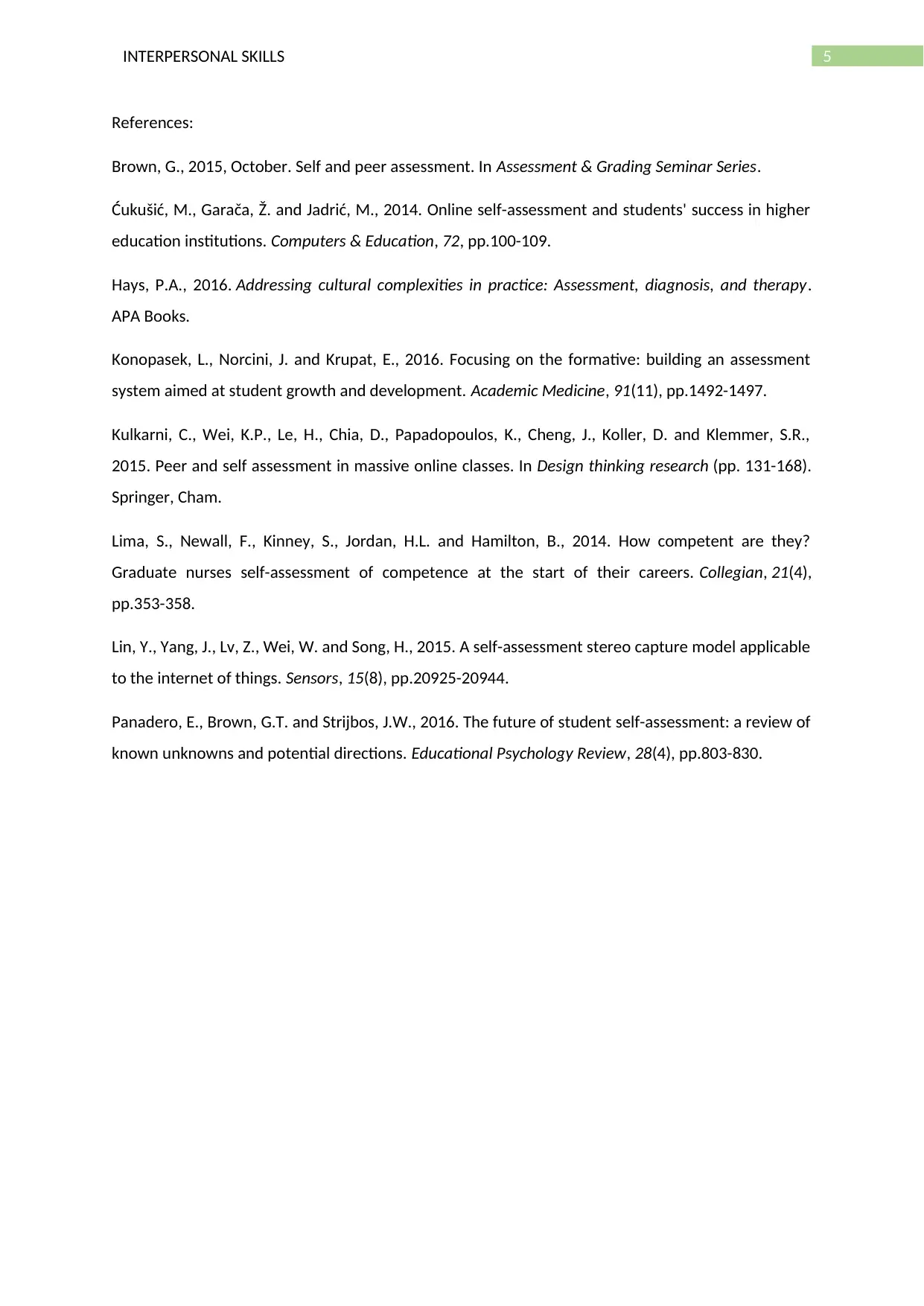
5INTERPERSONAL SKILLS
References:
Brown, G., 2015, October. Self and peer assessment. In Assessment & Grading Seminar Series.
Ćukušić, M., Garača, Ž. and Jadrić, M., 2014. Online self-assessment and students' success in higher
education institutions. Computers & Education, 72, pp.100-109.
Hays, P.A., 2016. Addressing cultural complexities in practice: Assessment, diagnosis, and therapy.
APA Books.
Konopasek, L., Norcini, J. and Krupat, E., 2016. Focusing on the formative: building an assessment
system aimed at student growth and development. Academic Medicine, 91(11), pp.1492-1497.
Kulkarni, C., Wei, K.P., Le, H., Chia, D., Papadopoulos, K., Cheng, J., Koller, D. and Klemmer, S.R.,
2015. Peer and self assessment in massive online classes. In Design thinking research (pp. 131-168).
Springer, Cham.
Lima, S., Newall, F., Kinney, S., Jordan, H.L. and Hamilton, B., 2014. How competent are they?
Graduate nurses self-assessment of competence at the start of their careers. Collegian, 21(4),
pp.353-358.
Lin, Y., Yang, J., Lv, Z., Wei, W. and Song, H., 2015. A self-assessment stereo capture model applicable
to the internet of things. Sensors, 15(8), pp.20925-20944.
Panadero, E., Brown, G.T. and Strijbos, J.W., 2016. The future of student self-assessment: a review of
known unknowns and potential directions. Educational Psychology Review, 28(4), pp.803-830.
References:
Brown, G., 2015, October. Self and peer assessment. In Assessment & Grading Seminar Series.
Ćukušić, M., Garača, Ž. and Jadrić, M., 2014. Online self-assessment and students' success in higher
education institutions. Computers & Education, 72, pp.100-109.
Hays, P.A., 2016. Addressing cultural complexities in practice: Assessment, diagnosis, and therapy.
APA Books.
Konopasek, L., Norcini, J. and Krupat, E., 2016. Focusing on the formative: building an assessment
system aimed at student growth and development. Academic Medicine, 91(11), pp.1492-1497.
Kulkarni, C., Wei, K.P., Le, H., Chia, D., Papadopoulos, K., Cheng, J., Koller, D. and Klemmer, S.R.,
2015. Peer and self assessment in massive online classes. In Design thinking research (pp. 131-168).
Springer, Cham.
Lima, S., Newall, F., Kinney, S., Jordan, H.L. and Hamilton, B., 2014. How competent are they?
Graduate nurses self-assessment of competence at the start of their careers. Collegian, 21(4),
pp.353-358.
Lin, Y., Yang, J., Lv, Z., Wei, W. and Song, H., 2015. A self-assessment stereo capture model applicable
to the internet of things. Sensors, 15(8), pp.20925-20944.
Panadero, E., Brown, G.T. and Strijbos, J.W., 2016. The future of student self-assessment: a review of
known unknowns and potential directions. Educational Psychology Review, 28(4), pp.803-830.
⊘ This is a preview!⊘
Do you want full access?
Subscribe today to unlock all pages.

Trusted by 1+ million students worldwide
1 out of 6
Related Documents
Your All-in-One AI-Powered Toolkit for Academic Success.
+13062052269
info@desklib.com
Available 24*7 on WhatsApp / Email
![[object Object]](/_next/static/media/star-bottom.7253800d.svg)
Unlock your academic potential
Copyright © 2020–2025 A2Z Services. All Rights Reserved. Developed and managed by ZUCOL.




